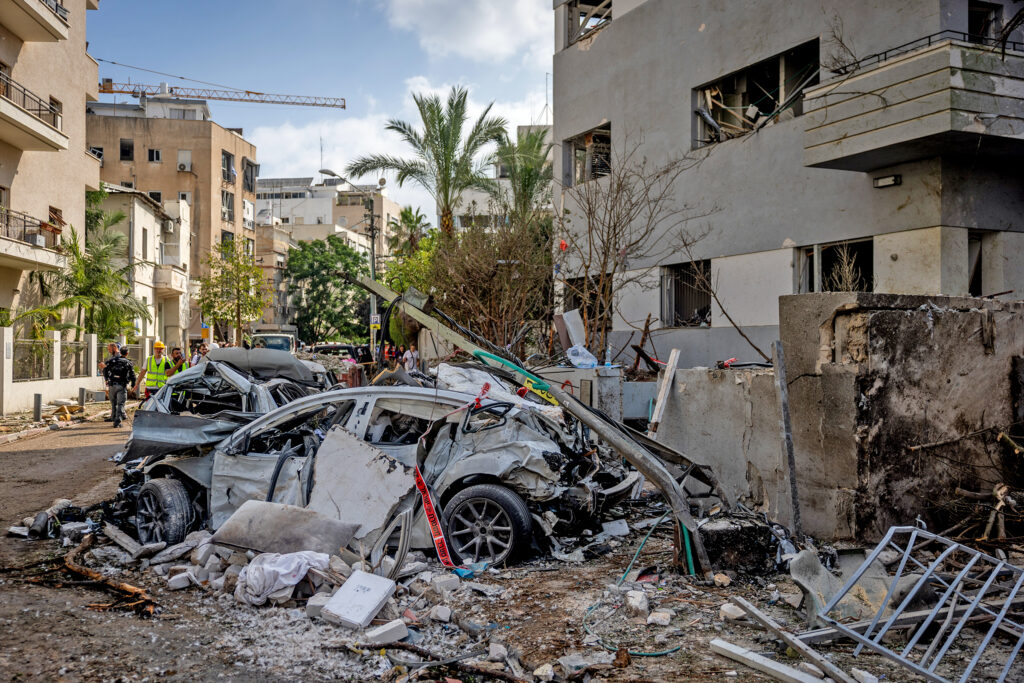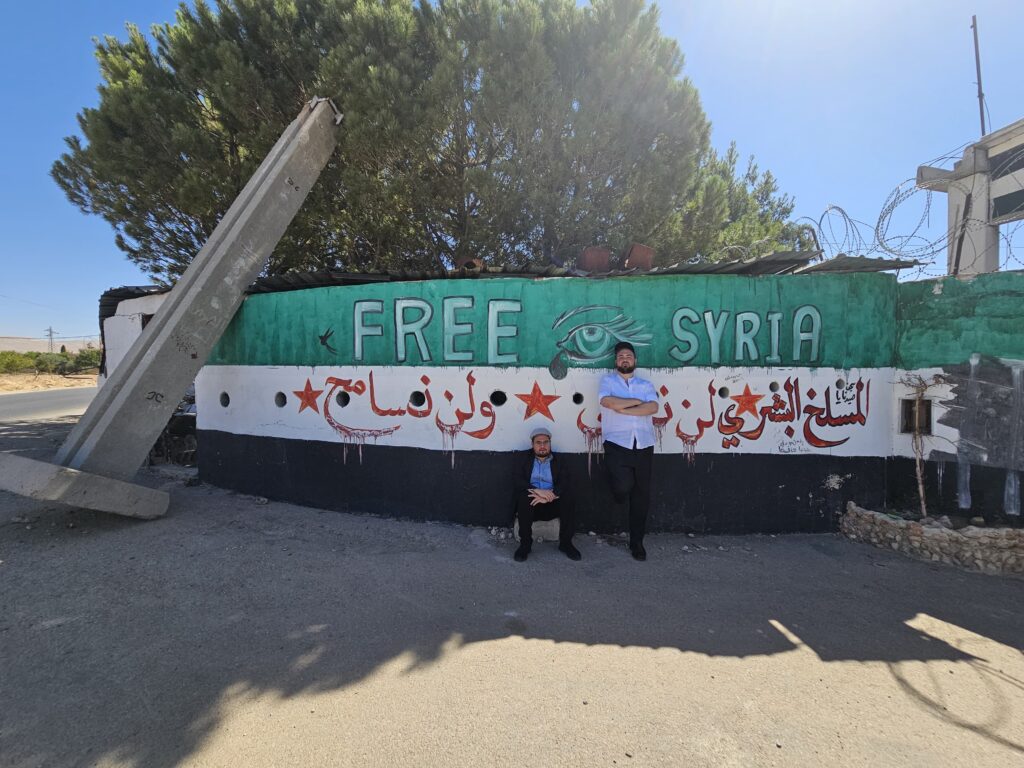Last Week In Jerusalem
By Larry Gordon
My suitcase was sitting empty on the floor in another room. I’ve learned to pack quickly when traveling, and I expected this trip to be no different.
How wrong I was.
Our flight was scheduled for late Saturday night or rather, early Sunday morning at 2:30 a.m. But on Thursday morning, as I followed the news, I began to question whether this was the right time to travel.
One of our traveling companions messaged me noon on Thursday saying the situation in Israel didn’t look good. Still, he didn’t think anything serious would happen, and our plans should go ahead.
In 45 years of traveling to Israel, this kind of uncertainty has only happened once before. Even during the COVID era, we found ways in, using shots, boosters, ID cards, and good contacts.
The last time we nearly canceled a trip was about 20 years ago, during a wildcat labor strike at Ben Gurion Airport that grounded all flights. I guess it’s always one challenge or another.
But this feels different. Hopefully, it will be brief, short-lived, and effective. President Trump and Prime Minister Netanyahu have been clear: Iran cannot be allowed to possess nuclear weapons.
Of course, Barack Obama and Joe Biden said the same thing. But the difference is that Obama’s and Biden’s words often came with deception.
If you heard Obama claim that he secured an agreement with Iran to halt nuclear development and that Trump abrogated that treaty, that’s only partially true. The withdrawal from the Joint Comprehensive Plan of Action (JCPOA), which limited Iran’s nuclear program in exchange for sanctions relief, was based on the Trump administration’s claim that Iran was not adhering to the agreement and that it was a flawed deal. The INF Treaty, which eliminated an entire class of nuclear weapons, was terminated after the U.S. accused Russia of violating the treaty.
The JCPOA was designed for Iran to pause its nuclear ambitions—but under terms that effectively allowed Iran to develop nuclear weapons in a relatively short timeframe. Obama was buying time, but also conceding to Iran’s conditions, putting Israel and other nations at risk.
When Obama pronounced that Iran would not be allowed to build or possess such a bomb, he meant that would be the case during his presidency, but in the years following his administration, that would be an issue beyond his presidential reach.
The primary objective in this battle must be to end Iran’s nuclear threat that jeopardizes the world. Ideally, regime change and the establishment of a democracy—at least a quasi-democracy—in Iran would be a hopeful outcome, but that may be more than anyone can expect right now.
And that is the essential dichotomy between then and now. That is, when Obama or Biden said that Iran would not be allowed to possess nuclear weapons, there was no need for the words be true. Hopefully, with Mr. Trump in office, when he says no nukes for Iran, he really means no nukes.
But this is not the simple matter that it might look like on the surface. There is a great deal of global strategy at play here that, as I write these words, the ultimate outcome is far from certain.
Over the last few days, word has emerged that Russia’s Putin has offered to be an intermediary between Israel and Iran. The Russian president once had a fairly good relationship with Israel, especially considering that over one million former Russian citizens now reside in Israel.
At the same time, at the outset of their war with Ukraine three years ago, then-President Biden demanded that Prime Minister Netanyahu express his support for Ukraine in the war with Russia. It was obviously a dilemma for Israel but did not help Israel curry favor with the Russian president, which they presently might be able to effectively utilize.
Reports over the last few days say that both President Trump and the Prime Minister have had phone conversations with Mr. Putin. Just like my article last week talked about our plans to be in Israel this week, the hope is that somehow the fighting will end in the Mid-East and Iran will agree to rid itself of its nuclear ambitions, though the Ayatollahs and Mullahs will never be deprogrammed of their hatred for Israel and Jews, at least not anytime soon.
And then there is the more complicated matter of the role China plays in all of this. During the first Trump administration, the president managed to apply sanctions to any country that did business with Iran, which essentially meant China. With the loosening of restrictions by the Biden administration and the work of foreign policy failures like Antony Blinken and Jake Sullivan, Iran has been economically rebuilt.
Today, China imports 90% of their oil from Iran in the aftermath of the Biden policy of looking the other way. Ideally the oil production facilities of Iran must be marginalized, but that can only happen if President Trump can get U.S. oil production up to par so that China can get the oil that they need from the U.S.
According to reports on Monday, Israel’s missile defense devices are intercepting as much as 99% of missiles and drones being launched at Israel. On TV news, the explosions, fires, injuries, and deaths do not look very good or encouraging. In fact, they are worrisome and very disturbing. We see crumbling buildings in places like Tel Aviv, Bat Yam, and Haifa. And there are people still unaccounted for under the rubble, and partially-collapsed buildings from the impact of the rockets.
The ballistic missiles are being fired from a distance of 1,150 miles away. They take between ten to twelve minutes to reach Israeli territory. That means that they are traveling at about 100 miles per minute when they are either intercepted in the air by one of Israel’s anti-missile devices, or make contact with their targets somewhere inside Israel.
When Israel ultimately succeeds and does away with the Iranian nuclear threat, it is not just about the fact that the Ayatollahs and Mullahs hate Jews and Israel in the deepest parts of their DNA. Their antisemitism for Israel and disdain for Jews is something they acquire in their mother’s milk. But that hatred they harbor will not be excised quietly or peacefully. In this instance, they will either have to walk out of their hiding places with their hands up or have their hatefulness extricated with a little more force, that is most likely military force.
Some are questioning the possibility that Israel acted too soon. Some Democrats claim that there was still a chance for diplomacy to work. But looking at the viciousness and the violence with which the Iranians are carrying on their war against Israel, is it any wonder how the Mullahs would conduct themselves with a nuclear bomb should they come to possess one?
Both Prime Minister Netanyahu and President Trump now have the opportunity to finally do what needs to be done to rid the world of the Iranian nuclear menace. May it happen very soon. n
Read more of Larry Gordon’s articles at 5TJT.com. Follow 5 Towns Jewish Times on Facebook, Instagram, and Twitter for updates and live videos. Comments, questions, and suggestions are welcome at 5TJT.com and on Facebook, Instagram, and Twitter.















